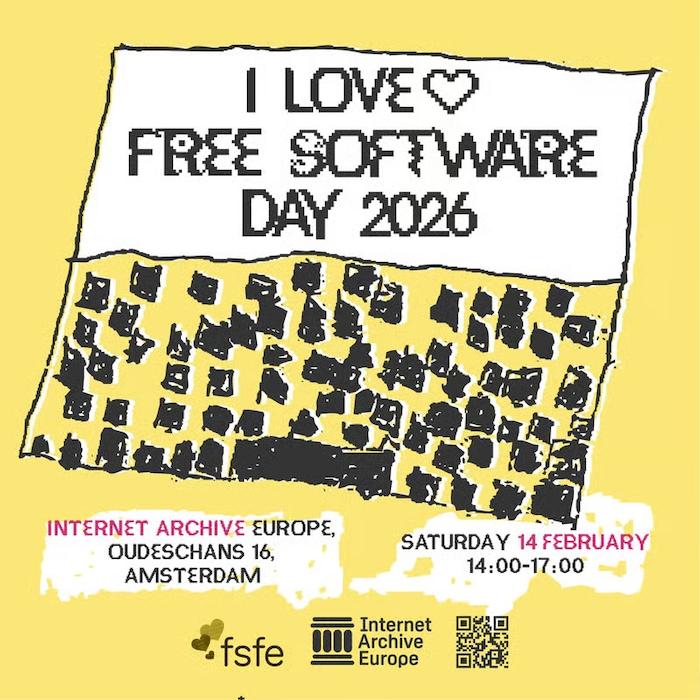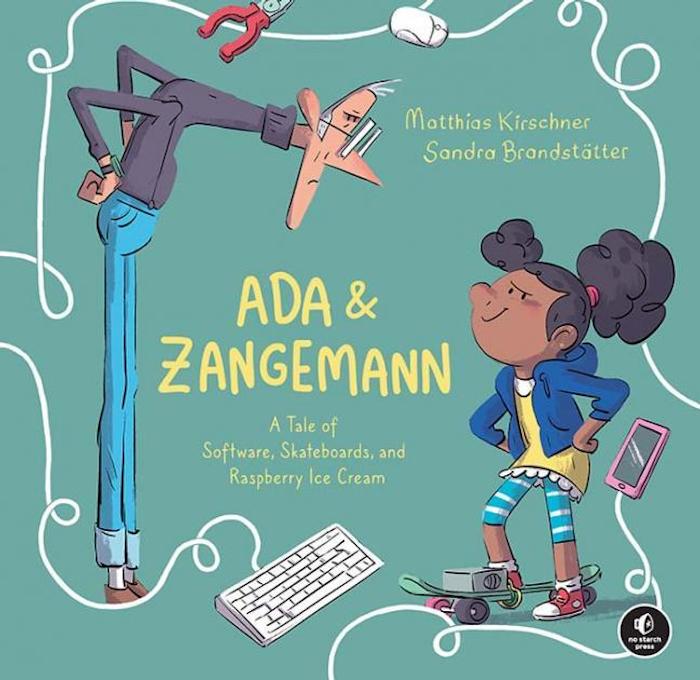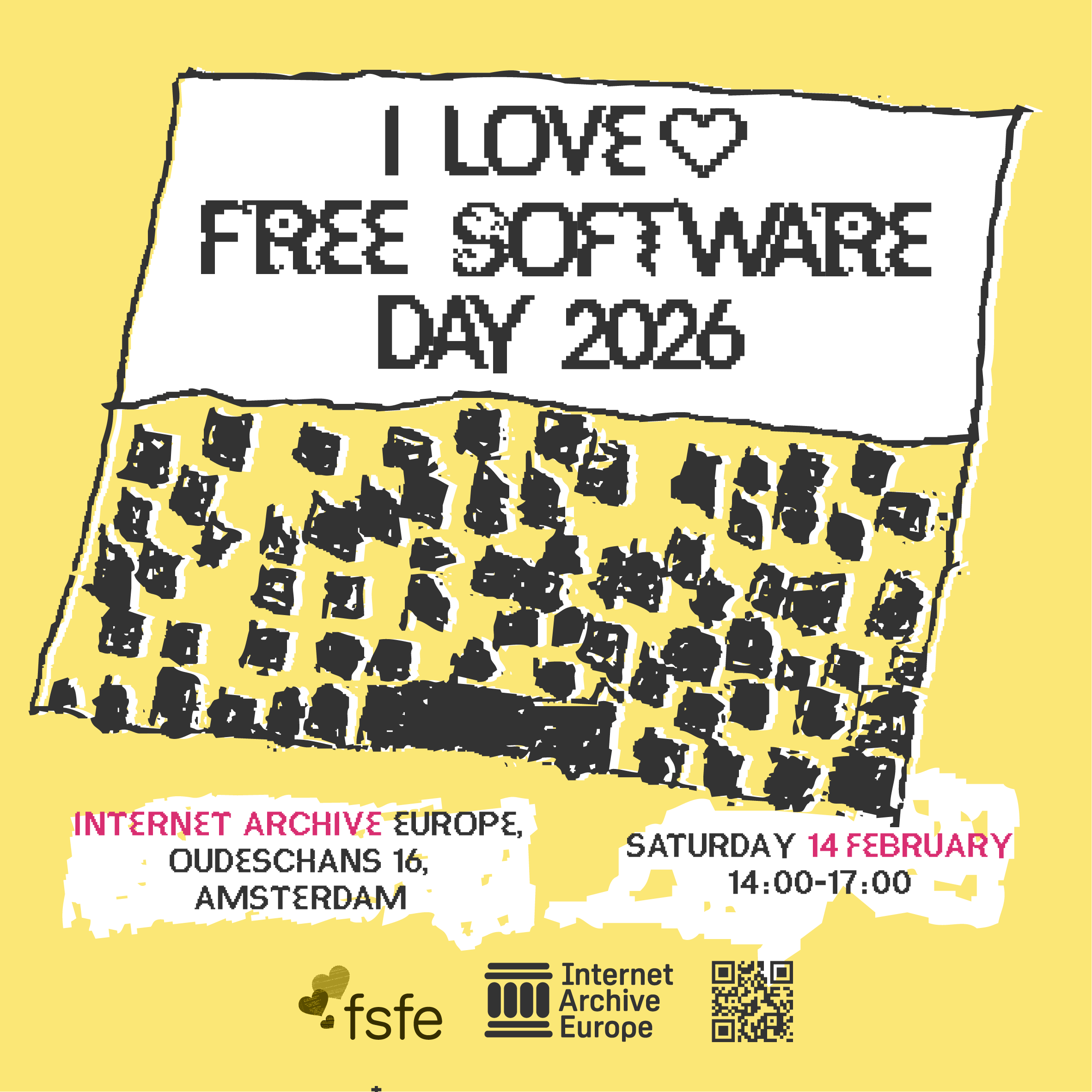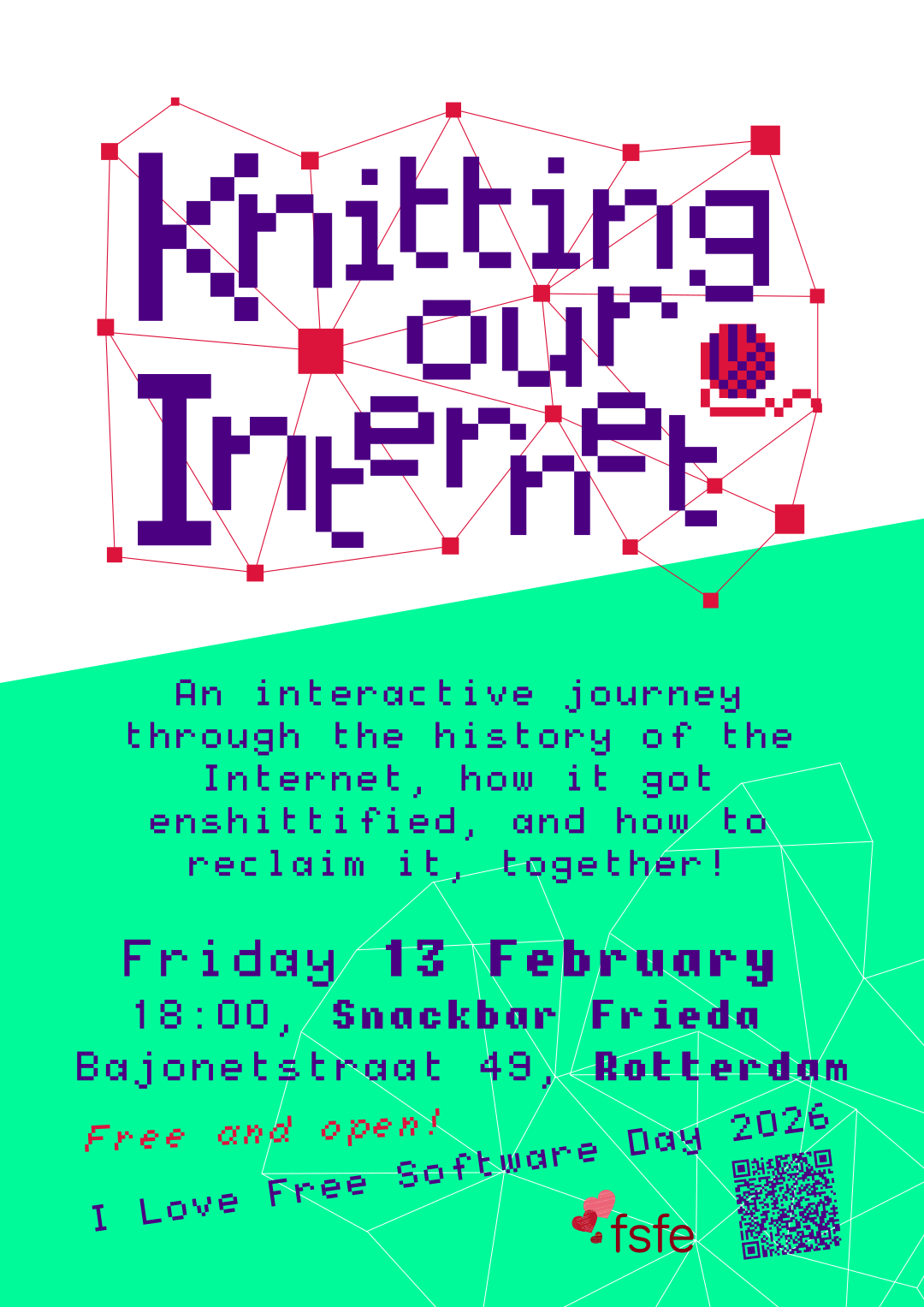We had a great gathering for I ❤️ Free Software Day #ilovefs in Amsterdam! We had a simultaneous Dutch and English reading of a
Ada & Zangemann by @kirschner of @fsfe. Afterwards we had a discussion with @tommi and @mayel of @Bonfire . It was such a pleasure to work with @nicorikken and @Holly . Thank you to everyone who came for the afternoon and brought their kids! Great to read to the next generation.
Bonfire
Public Interest Social Networks
Bonfire is built by communities, for communities—rooted in autonomy, mutual care, and collective power. Co-create your tools, reclaim your data, and resist manipulation by shaping your own federated digital spaces.
Previously at @bonfire@indieweb.social
RE: https://toot.wales/@teamtoot/116058537526076652
I'm so incredibly proud of what we’re building at @teamtoot - this isn't just another platform, it’s a community-owned space where the entire team works hard to keep a welcome.
We have 9 spots left for the launch event in #Cardiff - I’d love to see some familiar Fediverse faces and local advocates there to help us kick this off!
If you're ready to see what a digital cwtch looks like in the real world, we’d love to have you with us. Come grab a seat at the table! 👇
📢 Final Call: Only 9 spots left for our launch event!
We’re bringing together the people building #BetterSocial for #Wales .. and the UK ... and the world 😉
If you're within striking distance of #Cardiff on Feb 28th, join us!
Community members, Fediverse afficionados, social web advocates, policymakers, journalists - help us celebrate the Tŵt app launch 🎉
Details and RSVP request here:
If you're in Amsterdam this Saturday join us for reading of Ada & Zangemann by @kirschner@mastodon.social & Sandra Brandstätter in English and in Dutch, followed by a conversation about Free Software maintenance as care work, together with @mayel from Bonfire, at the @internetarchiveeurope@toot.community, Oudeschans 16, Amsterdam on Saturday Feb 14th at 14:00. More information and RSVP here.
@Bonfire I would like to support your current crowdfunding campaign but I do not want anything in return; also I do not want to share my postal address with Indiegogo. Is there a way I can just donate?
@smeikx@graz.social you can do so here, thanks! opencollective.com/bonfire-n...
In case you missed it, @Bonfire and the Newsmast Foundation are working together!
You can see the announcement and what we're working on in this wonderful talk by the Bonfire team at @fosdem last week.
#SocialWeb #Bonfire #Building #Partnership #SocialMedia #Fediverse #Decentralised
🔥 There's still some time to join the crowdfunding for @Bonfire and contribute to building a better world! 🤩
https://www.indiegogo.com/en/projects/bonfire/community
(if you don't know about Bonfire yet: it's an awesome project building a network that's community-governed, open, built for people instead of for companies, and engineered to support and empower communities. It's an amazing vision, and one they're well on their way to realize 💫✨)
( ⁂ and of course Bonfire federates with the fediverse 🥰 ⁂ )
💕 I Love Free Software Day 2026 💕
For this year’s I Love Free Software Day I am co-organising two special events, and I am super excited about them!
- 🧶 Knitting Our Internet at Snackbar Frieda, Rotterdam, on Friday Feb 13th at 18:00. All information here.
- 🛹 A reading of @kirschner’s Ada & Zangemann in English and in Dutch. After that, a conversation about Free Software maintenance as care work, together with @mayel from @Bonfire ❤️🔥 at the @internetarchiveeurope, Oudeschans 16, Amsterdam on Saturday Feb 14th at 14:00. All information here. Info about the super cool poster in the post below.
#FreeSoftware #SoftwareFreedom #ILoveFS #ILoveFreeSoftware #ILoveFS #IloveFS26 #ournet #KnittingOurInternet #SnackbarFrieda #Rotterdam #Amsterdam #InternetArchive #InternetArchiveEurope #AZbook #Ada #AdaZangemann #reading #event #decentralizaion #InternetHistory #Internet
Hello #fediverse! Thanks to my new DFF grant, I'm now looking to hire a PhD student to join me at AAU in Aalborg 🇩🇰 to work on "usable decentralization", i.e. on making distributed and federated cloud services accessible to the everyday user. For more details, see link below, and please don't hesitate to DM me with questions!
https://www.vacancies.aau.dk/phd-positions/show-vacancy/vacancyId/895183
#HCI #academia #getfedihired #decentralization #AAU #Aalborg #Denmark #selfhosted #selfhosting
Free Palestinian Hostages.
Some nice themes running through the #SocialWeb Devroom at #FOSDEM: storytelling from different national and international contexts (Italy, Netherlands, Germany, Europe); new apps and ideas (badgefed, splinter, FASPs, Spritely); building infrastructure and foundational tech (Bonfire, Fedify, Emissary). This is really great momentum! The speaker list today has been wonderful.
@liaizon@social.wake.st definitely! we're doing a presentation at the decentralised communication FOSDEM room tomorrow with that goal in mind!
@delta@chaos.social @matrix@mastodon.matrix.org @xmpp@fosstodon.org
🚄 The Bonfire team is rolling into Brussels for FOSDEM 2026!
Come find us at one of Europe’s biggest free software gatherings, with over 8,000 people, dozens of devrooms, and all things open source. We’re giving two talks this weekend (and both will be livestreamed at the links below, so you can join from anywhere, with recordings up afterward):
Building Modular, Consentful, and Federated Social Networks
🎥 Social Web devroom
🗓️ Saturday, Jan 31st, 17:10–17:30 CET
🌐 Local time where you are
Modular Communication Tools on the Open Social Web
🎥 Decentralised Communication devroom
🗓️ Sunday, Feb 1st, 14:45–15:15 CET
🌐 Local time where you are
We’ll be sharing more about the why and how of Bonfire and our ecosystem, hands-on demos, announcing new alliances, and real stories from communities using Bonfire today.
We can’t wait to connect with the open source and fediverse crowd, swap ideas, and meet anyone passionate about building healthier, more flexible, and consentful digital spaces. Whether you’re a developer, community organiser, or just fediverse-curious, come say hi!
FYI today's talk was moved 10 minutes earlier to 17:10 CET
🚄 The Bonfire team is rolling into Brussels for FOSDEM 2026!
Come find us at one of Europe’s biggest free software gatherings, with over 8,000 people, dozens of devrooms, and all things open source. We’re giving two talks this weekend (and both will be livestreamed at the links below, so you can join from anywhere, with recordings up afterward):
Building Modular, Consentful, and Federated Social Networks
🎥 Social Web devroom
🗓️ Saturday, Jan 31st, 17:10–17:30 CET
🌐 Local time where you are
Modular Communication Tools on the Open Social Web
🎥 Decentralised Communication devroom
🗓️ Sunday, Feb 1st, 14:45–15:15 CET
🌐 Local time where you are
We’ll be sharing more about the why and how of Bonfire and our ecosystem, hands-on demos, announcing new alliances, and real stories from communities using Bonfire today.
We can’t wait to connect with the open source and fediverse crowd, swap ideas, and meet anyone passionate about building healthier, more flexible, and consentful digital spaces. Whether you’re a developer, community organiser, or just fediverse-curious, come say hi!
A lot of tech-creep is down to the mindset: 'the technology could do this, so we'll programme it in' - instead of the mindset: 'what would actually be useful here ?'.
That's why we have washing machines you can turn on from a hundred miles away, but nothing that will load the dirty clothes into them.
Staying connected to the Fediverse at FOSDEM
Next week is European Open Source Week in Brussels, culminating in FOSDEM 2026 on the weekend. There are several important ways to stay connected to the Fediverse while you're visiting this week!
Mastodon maintains a booth at FOSDEM throughout the weekend. It's a great place to get Mastodon merch or take a selfie with the Mastodon team.
The Social Web Dev Room is a day-long event on Jan 31 in room H.2215 with loads of talks about Fediverse software and Fediverse organizing.
There will be a […]
@mavnn@bonfire.mavnn.eu how did you try disabling locales?
@mavnn@bonfire.mavnn.eu In version 1.0.2-alpha.6 you should be able to set COMPILE_ALL_LOCALES=no in env
hey @Bonfire ! i saw this thread and thought you might be interested. there are currently solutions like OpenTracks for tracking physical activity statistics, but none have direct integration with ActivityPub for social sharing. A bonfire extension to integrate with an existing activity tracker could help many cyclists, hikers, runners, and more activity clubs migrate from Strava to communities on the fediverse 
That'd be a cool extension indeed! Have you also looked at wanderer.to ?
Alongside a truckload of exciting updates, we're super thrilled to be featured in the latest update from @Bonfire 🔥
Check out the blog for a teaser on something new we'll be working with Bonfire to provide soon 👀
https://bonfirenetworks.org/posts/bonfire-1-0-1-building-momentum/
#SocialWeb #SocialMedia #Fediverse #Mastodon #Bonfire #DigitalCommunity
Hi everyone! We’re excited to share some updates:
Bonfire 1.0.1 is out! 🎉
This release is all about making your social web experience livelier, more connected, and truly yours. It brings features like following hashtags, scheduled posts, dashboard widgets, and more. This is the very first delivery from the maintenance work funded by your incredible support. Thank you for helping us reach this milestone and keep Bonfire thriving!
For details about the release see our latest blog post: Bonfire 1.0.1: Building Momentum
What’s next for crowdfunding?
If you're an existing backer, the pledge manager is now open. Please keep an eye out for updates there so we can start preparing rewards for you.
The campaign is open again for the next month. With core maintenance funded, every new pledge (or increased pledge from existing backers) now goes directly toward our first stretch goal: federated groups. Support or share our extended campaign to help fund community-owned, cross-instance spaces for real collaboration and self-governance.
Bonus good news: Thanks to a new grant, end-to-end encrypted messaging in Bonfire is now funded and in development!
Thank you once again for being part of the Bonfire movement! Your feedback, support, and community spirit make all of this possible. If you have questions or want to get involved, reach out or come say hello at FOSDEM if you’re in Brussels at the end of January!
With gratitude,
The Bonfire Team










